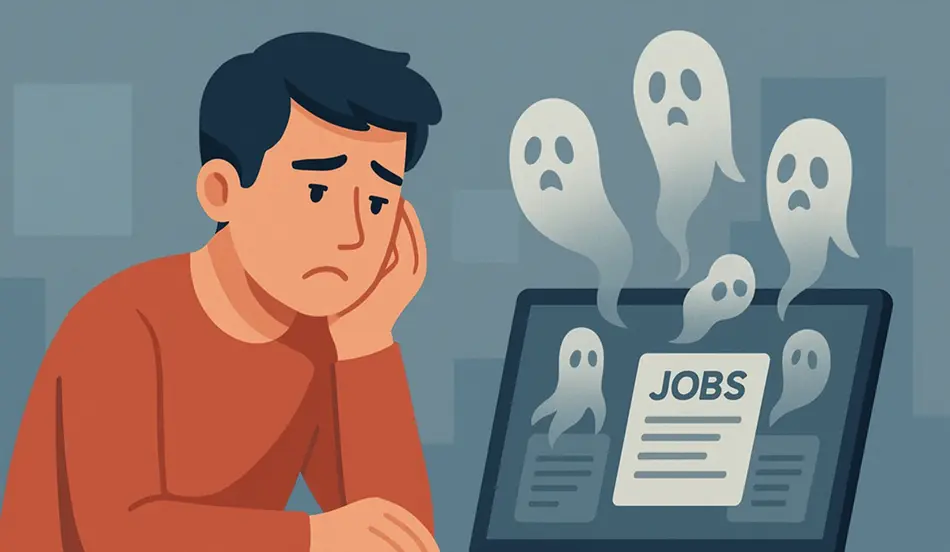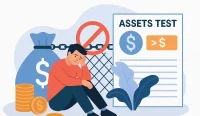The REAL Reason You Can’t Get A Job isn’t what you think. According to the Bureau of Labor Statistics, the job market is facing its largest revision in US history, with long-term unemployment at its highest rate in nearly a decade. Despite LinkedIn hosting nearly 2 million ghost jobs alone, job seekers continue to be met with claims of a booming economy. If the labor market is so strong, why are we continuously drowning in jobs that don’t even exist?
The answer is both shocking and infuriating: companies are deliberately posting fake job listings to manipulate workers, boost stock prices, and create the illusion of growth. This isn’t just unethical—it’s destroying lives and careers while the government turns a blind eye. For job seekers, understanding this reality is crucial for protecting your mental health, your time, and your future.
The Ghost Job Epidemic: By the Numbers
The statistics are staggering and reveal a systematic abuse of the job market:
• 70% of companies admit to posting fake jobs for various reasons
• 20-40% of online job ads are estimated to be fake
• 62% of employers post ghost jobs to make employees feel replaceable
• 77% report increased productivity from workers scared of losing their jobs
• 60% post fake jobs to make employees believe workload will be alleviated
These aren’t just numbers—they represent real people like Mora, a 23-year-old University of Iowa graduate who spent four years building client work and gaining real experience, only to find herself unable to get a job in her field. “It definitely makes me feel like a failure,” she shares. “I think we need to stop telling people that this is the way to be. This is the American dream.”
The Ghost Job Epidemic
With up to 40% of online job ads estimated to be fake, trust in the job market is eroding fast. Employers can lead the change by posting real, verified opportunities that make a genuine impact. Post your job on WhatJobs today and connect with candidates who are searching for authenticity and stability.
Post a Job Free for 30 Days →The Human Cost of Corporate Manipulation
Behind every ghost job posting is a real person whose life is being upended. Isaac, a biomedical engineer from Oregon, spent an entire year unemployed between March 2020 and March 2025. “What’s difficult is trying to determine the difference between what is and is not a real job,” he explains. “They all kind of look the same. In fact, a lot of them are generated by AI.”
Isaac’s experience highlights the cruel reality that job seekers face: they can’t distinguish between real opportunities and corporate manipulation. Even with a six-month emergency fund, unemployment insurance, and no debt, he barely managed to survive that year. “If someone was already under the weight of interest payments and late fees and other debt repayment, then I don’t understand how they can’t make it,” he says.
The Corporate Strategy Behind Ghost Jobs
Companies post fake jobs for three primary reasons, as revealed by a human resources recruiter:
• Market research – To gauge how little they can pay for maximum work
• Talent assessment – To measure available talent for future expansion
• Growth illusion – To appear growing to investors in our investor-driven economy
This creates a vicious cycle where companies dramatically upsize, receive investment dollars, then conduct massive layoffs because those jobs were never intended to be permanent. They just don’t tell employees that.
The Psychological Warfare on Workers
The psychological impact of ghost jobs extends far beyond the job search. Andra, a 27-year-old from Minneapolis, applied to thousands of jobs, with only a fraction ever being viewed on LinkedIn. “They weren’t even looking at the people applying,” she discovered.
Even after finally getting a job, the stress doesn’t disappear. Andra worked for a company that constantly posted listings, conducted interviews, but only hired “absolute perfect candidates” because they didn’t actually need anyone. “It was horrible,” she recalls. “You’re telling me I went and got a full degree to earn like a dollar more than nannying kids.”
The Identity Theft Crisis
The problem goes beyond fake jobs—it’s become a gateway to serious crime. Eric Thompson, who created the Truth in Job Advertising and Accountability Act (TJAA), discovered that job fraud is the number one growing crime in the United States, with almost a billion dollars in losses reported to the FTC.
“Identity theft is huge,” Eric explains. “We’re actually seeing people get hired by companies that send you all the W2, your direct deposit form, everything else that you would need for a job. And then especially for remote jobs, you go, you get all this done, you get all the paperwork, you send it back, and then you’re waiting on a start date or you have a start date. Start date comes around and you hear anything.”
The Legal Solution: Truth in Job Advertising and Accountability Act
Eric Thompson, after being laid off with over 20 years of IT experience, joined forces with a professional recruiter and lawyer to create the TJAA. This landmark legislation is designed to:
• Eliminate fake jobs through a “nutrition label” system for job postings
• Protect job seeker privacy and data ownership
• Hold employers, recruiters, and platforms accountable for deceptive practices
• Ensure every public job posting is genuine, funded, timely, and traceable
The TJAA requires companies to provide transparent information about job postings, similar to nutrition labels on food products, and makes job boards responsible for verifying the accuracy of this information.
The Legal Solution: Truth in Job Advertising
The TJAA aims to eliminate fake job postings, protect job seeker privacy, and hold platforms accountable. Employers can take the lead by posting genuine, transparent opportunities that build trust and credibility. Post your job on WhatJobs today and connect with candidates who value honesty and accountability.
Post a Job Free for 30 Days →The Mental Health Crisis
The impact on mental health is devastating. Eric shares that one of their founding members became involved because her brother became so distraught that he felt he needed to remove himself from the equation entirely. “We’ve had other members come forth and say after a severe struggle they’ve had to make the choice or they made the choice to leave this earth rather than continue to struggle.”
The silence from employers is deafening and destructive. “You really start to feel that you’re not worth anything when you can’t even get people to call you back and say you’re not qualified for this,” Eric explains.
How to Protect Yourself
While the system is broken, there are steps you can take to protect yourself:
• Research companies thoroughly before applying
• Look for red flags like vague job descriptions or unrealistic requirements
• Trust your instincts if something seems too good to be true
• Never provide sensitive information until you’ve verified the company and position
• Support legislative efforts like the TJAA to create systemic change
The Path Forward
The solution requires both individual action and systemic change. The TJAA represents a crucial step toward protecting job seekers, but it needs widespread support to become law. Eric’s team has created a Change.org petition that will be sent to congressional staffers once they reach 1,000 members.
This isn’t just about job seekers—it’s about the future of our country. When the nation’s youth feels worthless because they can’t get jobs, we’re not just failing individuals; we’re failing our collective future.
Frequently Asked Questions
What is the REAL reason you can’t get a job?
The REAL reason you can’t get a job is that 70% of companies post fake “ghost jobs” to manipulate workers, boost stock prices, and create the illusion of growth. These fake postings make up 20-40% of all online job ads.
Why do companies post fake jobs?
Companies post fake jobs for three main reasons: to conduct market research on how little they can pay workers, to assess available talent for future expansion, and to create the illusion of growth for investors in our investor-driven economy.
How can I tell if a job posting is fake?
You can identify fake job postings by looking for red flags like vague job descriptions, unrealistic requirements, AI-generated content, companies that never respond to applications, or positions that seem too good to be true.
What is the Truth in Job Advertising and Accountability Act?
The Truth in Job Advertising and Accountability Act (TJAA) is landmark legislation designed to eliminate fake jobs through a “nutrition label” system for job postings, protect job seeker privacy, and hold employers accountable for deceptive practices.
How does the ghost job crisis affect mental health?
The ghost job crisis severely impacts mental health by making job seekers feel worthless, creating financial stress, and leading to depression and even suicide. The constant rejection and silence from employers is psychologically devastating.
What can I do to fight back against ghost jobs?
You can fight back by supporting the TJAA through the Change.org petition, researching companies thoroughly before applying, reporting fake job postings, and spreading awareness about this systemic problem.
How widespread is the ghost job problem?
The ghost job problem is extremely widespread, with 70% of companies admitting to posting fake jobs, 20-40% of online job ads being fake, and job fraud being the number one growing crime in the United States with almost a billion dollars in reported losses.
A Real-World Example: Sarah’s Struggle
Sarah, a recent marketing graduate, spent six months applying to over 500 jobs before discovering the ghost job crisis. She had tailored her resume, written personalized cover letters, and even reached out to hiring managers on LinkedIn—all to no avail.
“I was getting so frustrated,” Sarah recalls. “I had great internships, relevant coursework, and even some freelance experience, but I couldn’t even get a callback. I started to think there was something wrong with me.”
It wasn’t until Sarah attended a job seeker support group that she learned about ghost jobs. “Someone mentioned that their friend worked at a company that was constantly posting jobs but never actually hiring externally. They were just moving people around internally and posting externally for legal reasons.”
This revelation changed everything for Sarah. She started researching companies more thoroughly, looking for signs of genuine hiring versus corporate manipulation. Within two months, she landed a real position at a company that was actually growing and needed her skills.
“The difference was night and day,” Sarah says. “When I found a company that was genuinely hiring, the process was smooth, they responded quickly, and I could tell they actually wanted to bring me on board. It wasn’t about me being unqualified—it was about me applying to jobs that didn’t exist.”
Take Action Against the Ghost Job Crisis
The ghost job crisis is destroying lives and careers, but you don’t have to be a victim. Understanding the problem is the first step toward protecting yourself and fighting for change.
Don’t let fake job postings waste your time, damage your mental health, or make you question your worth. You deserve real opportunities, not corporate manipulation.




